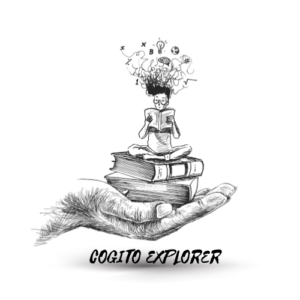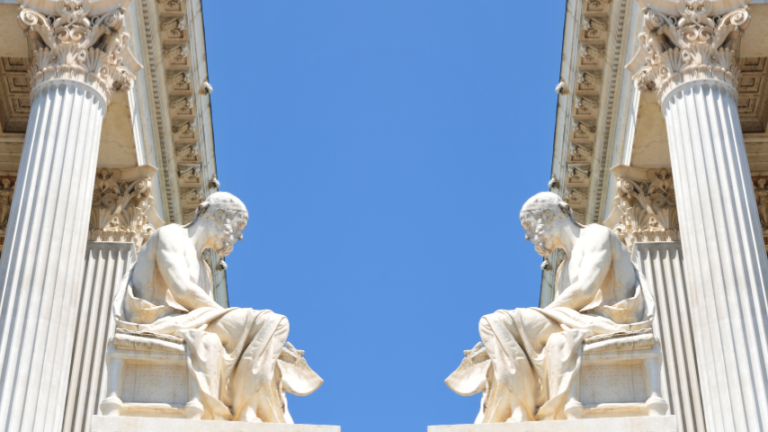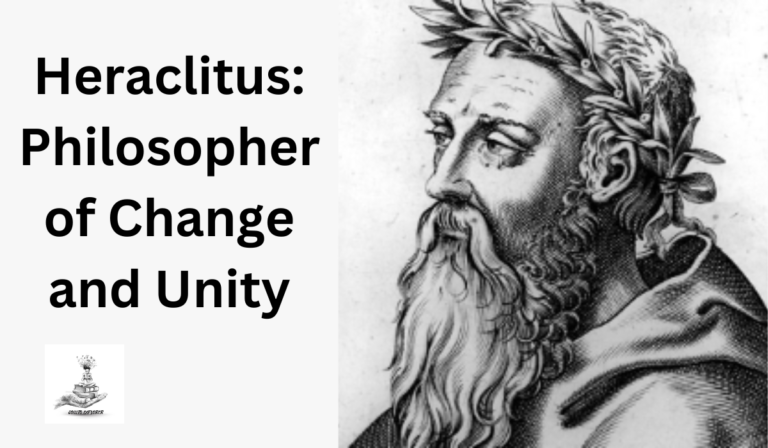Anaximander – Unveiling the Cosmos
Let us embark on a more comprehensive exploration of the life and legacy of Anaximander, an intellectual pioneer whose ideas resonate across the ages, shaping the very fabric of our understanding of the universe.
Introduction

In the lively city of Miletus during the 6th century BCE, a young mind named Anaximander emerged, drawn to the vibrant intellectual atmosphere that permeated the streets. Though the details of his early life are shrouded in historical obscurity. What becomes clear is that he evolved into a luminary in the fields of philosophy, science, and cosmology.
Early Days and Influences
Anaximander’s intellectual odyssey commenced under the mentorship of Thales, a philosopher of great renown. Miletus, a crucible of diverse ideas, served as the backdrop for the formation of Anaximander’s worldview. As a disciple of Thales, he imbibed the foundational principles that would later define his revolutionary contributions.
Thales: A Guiding Light
Thales, a philosopher of enduring renown, emerged as a guiding light for Anaximander. Born in Miletus, Thales was a trailblazer in a time when the predominant mode of explaining the world was steeped in mythology. Thales sought a departure from these mythological narratives, striving instead to uncover rational explanations for the phenomena that surrounded them. His influence on Anaximander was profound, setting the stage for a departure from tradition.
Miletus: A Crucible of Diverse Ideas
Miletus, situated along the fertile banks of the Meander River, was not merely a geographical location but a crucible of diverse intellectual currents. The city thrived as a hub where ideas from various cultures, disciplines, and schools of thought intermingled. This amalgamation of diverse perspectives fostered an atmosphere ripe for intellectual ferment, providing the perfect backdrop for Anaximander’s formative years.
Anaximander’s Apprenticeship
Anaximander’s journey into the realms of philosophy began as he stepped into the role of a disciple under Thales’ mentorship. In this intellectual apprenticeship, Anaximander imbibed the foundational principles that Thales ardently espoused. These principles encompassed a rejection of mythological explanations, a commitment to seeking rational understanding, and a daring quest for fundamental principles governing the cosmos.
Thales’ Pursuit of Universal Principles
Thales’ philosophical pursuits were characterized by a relentless quest for universal principles. He sought to identify the underlying substance, or “arche,” that constituted the essence of all things. While Thales proposed water as this fundamental substance, his emphasis on uncovering a universal principle laid the groundwork for Anaximander’s subsequent philosophical innovations.
Anaximander’s Departure
Anaximander, inspired by Thales’ intellectual daring, embarked on his philosophical exploration, marked by a departure from his mentor’s focus on a singular substance. Instead, Anaximander introduced the concept of the “anaximander apeiron” – the boundless or indefinite. This departure reflected not only Anaximander’s independent thinking but also the dynamic nature of philosophical inquiry within the Miletian tradition.
Legacy of Thales and Anaximander
The intellectual lineage from Thales to Anaximander forms a narrative thread that weaves through the fabric of ancient Greek philosophy. Thales, with his emphasis on universal principles, laid the groundwork for Anaximander’s innovative departure into abstract and boundless principles. Together, they shaped a philosophical trajectory that would influence subsequent generations of thinkers.
The Ripple Effect
The intellectual synergy between Thales and Anaximander created a ripple effect that extended beyond their contributions. The questioning of mythological explanations, the pursuit of rational understanding, and the exploration of fundamental principles became enduring themes in the evolution of Greek philosophy. The vibrancy of Miletus as a crucible played a pivotal role in catalyzing this transformative intellectual journey.
Miletus as a Crucible
Miletus, with its diverse intellectual currents and the dynamic exchange of ideas, served as a crucible that nurtured and refined the philosophical musings of Thales and Anaximander. It was a space where intellectual ferment thrived, shaping the course of their inquiries and fostering an environment that encouraged bold departures from established norms.
The Boundless Wonder: Anaximander Apeiron
Anaximander’s departure from his mentor’s focus on a single fundamental substance marks a pivotal moment in the evolution of ancient Greek philosophy. He introduced the concept of the “apeiron,” an abstract, boundless principle challenging the prevailing belief in a singular, tangible element as the source of all things. This novel idea laid the groundwork for a more inclusive and nuanced comprehension of the cosmos.
Anaximander’s conceptual leap expanded the philosophical landscape, inviting thinkers to explore the universe not as a static entity but as a dynamic interplay of infinite possibilities. In doing so, he fostered a philosophical environment that encouraged curiosity and intellectual daring, paving the way for future generations to delve deeper into the mysteries of existence.
Navigating the Cosmos
In his opus “On Nature,” now regrettably lost to time, Anaximander presented a cosmological vision that revolutionized contemporary understanding. Envision concentric rings with Earth at the epicenter, adorned by celestial bodies like stars and planets. While simplistic by modern standards, this imaginative model represented a groundbreaking departure from mythological explanations, foreshadowing the evolution of cosmological thought. Anaximander’s concentric rings suggested a structured and ordered cosmos, introducing a framework that would inspire later philosophers and astronomers to refine and expand upon. His visionary approach laid the groundwork for a transition from mythic narratives to empirical observations, propelling humanity toward a more scientific comprehension of the universe.
Charting Unknown Territories
Anaximander inquisitiveness extended beyond the theoretical realms of philosophy into the practical realm of cartography. He ventured into the uncharted territories of geography, leaving us with one of the earliest known maps. This visual testament to his curiosity showcased a practical approach to understanding the world. Supplementing abstract philosophical concepts with tangible representations of the known world.
Anaximander’s cartographic endeavor not only demonstrated his intellectual versatility but also highlighted the intersection of theoretical and practical knowledge in his pursuits. His mapping of the world, though rudimentary by today’s standards, served as a foundational step in human attempts to visually capture and comprehend the vastness and diversity of our planet. In charting the unknown, Anaximander’s map becomes a historical artifact. Echoing his curiosity and contributing to the gradual evolution of geographical understanding.
Life’s Origins: Evolutionary Musings
Anaximander’s curiosity about the origins of life led him to propose a theory hinting at an early form of evolution. Diverging from prevailing beliefs that humans directly descended from specific animals. He posited that humanity must have evolved from a more primitive form. Though far from the detailed evolutionary theories of today. Anaximander musings demonstrated a willingness to explore a wide range of disciplines in his quest for understanding.
Anaximander’s Philosophical Foundation
Central to Anaximander’s philosophical contributions was his emphasis on the “apeiron.” Departing from the reductionist approach of his predecessors. He encouraged contemplation on the nature of the cosmos as an interconnected and boundless entity. This departure laid the groundwork for a broader metaphysical exploration and set the stage for future generations of thinkers to delve into the mysteries of existence.
An Enduring Legacy
Despite the loss of much of Anaximander’s original works, the essence of his ideas endured through the writings of later philosophers, most notably Aristotle. His intellectual legacy stands as a cornerstone for the scientific inquiry that would flourish in ancient Greece and beyond. Anaximander’s emphasis on universal principles and structured exploration of the cosmos left an indelible mark on the course of Western philosophy.
The Enigma of Anaximander
The details surrounding Anaximander’s life and death remain elusive, creating an enigma that adds to the allure of his legacy. Like many ancient philosophers, the specifics of his narrative have been lost to time. Leaving behind only the imprint of his intellectual contributions.
A Call to Contemplate
In conclusion, Anaximander beckons us to contemplate the boundless wonders of the universe. His philosophical daring, cartographic curiosity, and evolutionary speculations inspire us to explore the unknown, question the status quo, and chart new territories in our understanding of existence.
As we reflect on the life and ideas of Anaximander, let us carry forward the torch of inquiry and intellectual exploration. In the vast cosmos of knowledge, may we, like Anaximander, chart our course with curiosity, resilience, and an unyielding commitment to unravel the mysteries that surround us.







